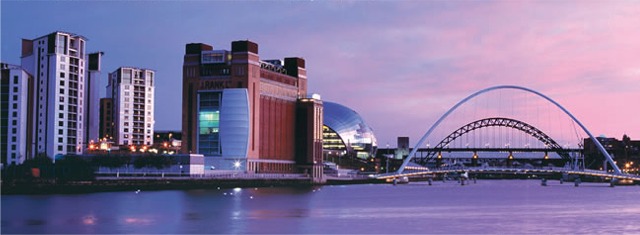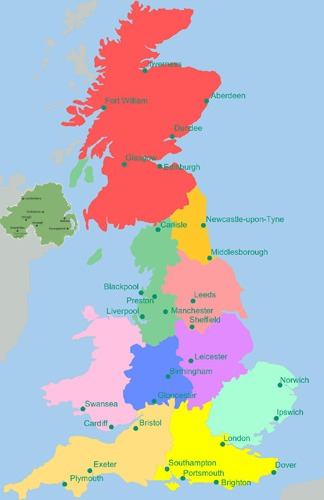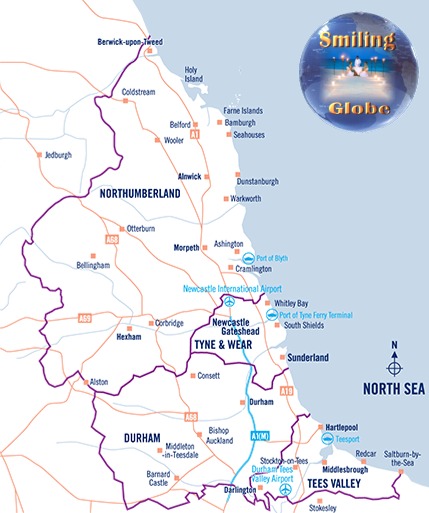North East England
North East England
 North East England is one of the nine official regions of England. It covers Northumberland, County Durham, Tyne and Wear, and Teesside (including parts of North Yorkshire). The only cities in the region are Durham, Newcastle upon Tyne and Sunderland. Other large settlements in the region include: Darlington, Gateshead, Hartlepool, Middlesbrough, Redcar, South Shields, Stockton-on-Tees. The region is home to three UK conurbations: Teesside, Wearside, and the largest Tyneside which is the sixth most populous conurbation in the United Kingdom.
North East England is one of the nine official regions of England. It covers Northumberland, County Durham, Tyne and Wear, and Teesside (including parts of North Yorkshire). The only cities in the region are Durham, Newcastle upon Tyne and Sunderland. Other large settlements in the region include: Darlington, Gateshead, Hartlepool, Middlesbrough, Redcar, South Shields, Stockton-on-Tees. The region is home to three UK conurbations: Teesside, Wearside, and the largest Tyneside which is the sixth most populous conurbation in the United Kingdom.
Generally the region is hilly and sparsely populated in the North and West, and urban and arable in the East and South. The highest point in the region is The Cheviot, in the Cheviot Hills, at 815 metres (2,674 ft).
As well as its urban centres of Tyneside, Wearside and Teesside the region is also noted for the richness of its natural beauty. Northumberland National Park, the region's coastline, its section of the Pennines including Teesdale and Weardale provides evidence for this. It also has great historic importance, the evidence of which is seen in Northumberland's Castles, and the two World Heritage Sites of Durham Cathedral and Durham Castle and of Hadrian's Wall. St. Peter's Church in Monkwearmouth, Sunderland along with St. Pauls in Jarrow also hold significant historical value. They have a joint bid to become a World Heritage Site. The region's strong religious past can also been seen in works such as the Lindisfarne Gospels.
| |
Scotland
Population: Around 5.2 million Capital: Edinburgh Largest City: Glasgow Official Language(s): English, Gaelic, Scots
- |
| |
Northern
Ireland Population: 1,8 million Capital: Belfast |
| |
North East England
Population: 2,515,442 covers Northumberland, County Durham, Tyne and Wear, and Teesside (including parts of North Yorkshire). Cities: Darlington, Durham, Gateshead, Hartlepool, Middlesbrough, Redcar, South Shields,
Stockton-on-Tees, Sunderland and Newcastle upon
Tyne. |
| |
North West England Population: 6,853,200
Manchester
- Carlisle - Blackpool - Preston - Liverpool |
| |
Yorkshire Population: 5,142,400
Leeds -
Sheffield
- Kingston upon Hull |
| |
East Midlands Population: 4,172,179 Lincoln -
Leicester / combined area of Derbyshire, Leicestershire, Rutland, Northamptonshire, Nottinghamshire and most of Lincolnshire. |
| |
West Midlands Population: 5,267,337 contains the second most populous British city,
Birmingham, and the larger West Midlands conurbation, which includes the city of
Stoke-on-Trent
Wolverhampton and large towns of Dudley, Solihull, Walsall and West Bromwich. |
| |
Wales Population: 2.999.300 Swansea -
Cardiff |
| |
South West England Population: 4.999.300 The largest city is
Bristol. Other major urban centres include
Plymouth, Swindon, Gloucester, Exeter, Bath, and the South East Dorset conurbation of Bournemouth, Poole and Christchurch |
| |
Greater London Population: 7,953,600 is the top-level administrative division of England covering
London. It was created in 1965 and spans the
City of
London, including Middle Temple and Inner Temple, and the 32 London boroughs. |
| |
South East England Population: 8,000,550
Large City: Southamton
Include Berkshire, Buckinghamshire, East Sussex, Hampshire, Isle of Wight, Kent, Oxfordshire, Surrey and West Sussex. |
| |
East of England Population: 5,388,140 include
Ipswich
Essex, Hertfordshire, Bedfordshire, Cambridgeshire, Norfolk and Suffolk. |
|

|
Visit North East England
 By Rail
By Rail
The East Coast Main Line cuts through the region with stops at Newcastle, Durham and Darlington, providing fast connections to London and Edinburgh. The region is also served by the Durham Coast Line which connects Sunderland, Hartlepool and Middlesbrough with the main line. East Coast, based in York and the only current nationalised railway company in the UK, has services along the full length of the ECML, to Edinburgh and beyond and is the operator of most of the stations on the route. Grand Central Railway since December 2007 has linked Sunderland, and Teesside with London, being non-stop from York onwards; it does not have electric trains and uses the Northallerton–Eaglescliffe Line and Durham Coast Line. Local services along these lines, and most other local routes in the North East are provided by Northern, based in Manchester. First TransPennine Express, also based in Manchester, have long-distance services from Newcastle and Middlesbrough to Manchester, via West
Yorkshire.
The Tyne and Wear Metro is a light rail network which serves the metropolitan county of Tyne and Wear, with stations in both Newcastle and Sunderland city centres, other towns and suburbs in the county, as well as at Newcastle Airport and other attractions such as the St James' Park, Stadium of Light, and Gateshead International Stadium
By Road
The two main arterial carriageways, the A1 and the A19, mirror the railway trajectory. However, north of Morpeth, the A1 is single carriageway. The Tyne Tunnel was opened as a single-carriageway in 1967, and a new tunnel, built alongside, was opened in February 2011. The A1 Newcastle Western Bypass was completed in the early 1990s. The A66 connects Teesside with Darlington. The A68 takes a cross-country central route over the North Pennines and Cheviot Hills to Scotland, often following the Roman road Dere Street.
Queen of Scandinavia berthed at North Shields
By Sea
There is a ferry terminal at North Shields, accessed via the A187 from the Tyne Tunnel. DFDS operate two ferries a day to Amsterdam and, until 1 September 2008, one a day on the Stavanger - Haugesund - Bergen route.
By Air
The two main airports are Newcastle Airport located north of the city near Ponteland and Durham Tees Valley Airport located east of Darlington.
See ratings  af North East England , Do you have rice or praise for this Bed and Breakfast, Write your review
af North East England , Do you have rice or praise for this Bed and Breakfast, Write your review 